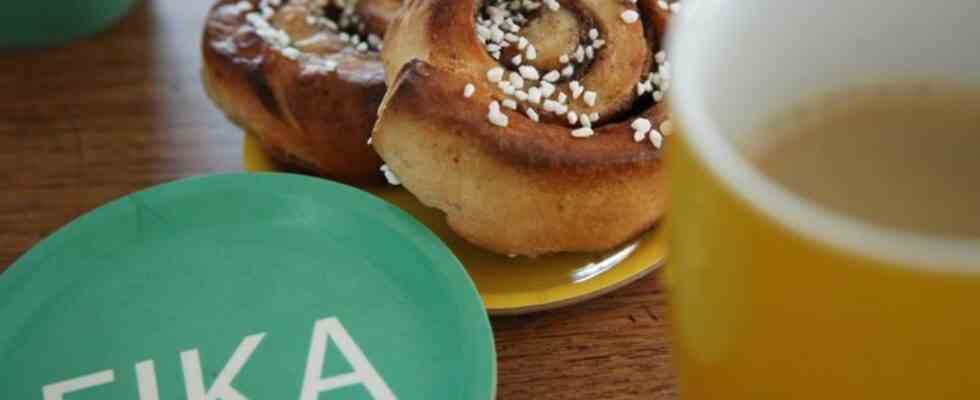world happiness day
Fika – the small break happiness in Sweden
For Scandinavians, the fika tradition offers a welcome break from the workday to escape the stress of work with colleagues or friends. Photo: Steffen Trumpf/dpa
© dpa-infocom GmbH
The Swedes have long been among the happiest people in the world. A secret ingredient of Swedish happiness can be found in the daily coffee break at work.
A German and a Swede go to a café to take a little break from work. He orders butter cake, she orders a cinnamon roll. The drink to go with it is the same: coffee.
And yet something is usually different when Swedes pause for a moment in this way: In regular coffee breaks during everyday work and leisure time, they not only replenish their caffeine levels, but also their happiness reserves – and that has a long tradition in the high North.
Fika is the name of this tradition, which belongs to Sweden like Ikea, Abba and Greta Thunberg. Today, according to the Swedish dictionary, this little word simply means “drink coffee” or “take a coffee break”. For the Scandinavians, however, the fika is much more: It offers a welcome break in the working day to get away from the stress of work with colleagues or friends. For some, some pastries are enough during these breaks, others treat themselves to a cinnamon roll or even a piece of princess cake. On the other hand, there is hardly a way around one – coffee.
Now the people in neighboring Finland and Denmark are considered to be a bit happier, but the Swedes have also long been among the happiest people in the world: According to the most recent report on World Happiness Day on March 20, Sweden came in seventh, ahead of Germany 14. Is that also due to the regular coffee breaks?
In fact, such fika breaks are contractually guaranteed to Swedish employees and also part of the paid working hours, as Richard Tellström from Stockholm University explains. He is considered one of the leading experts on Swedish food culture and history. The fika is a joint work break that arose from wage agreements with the Swedish unions, he says. “It allows people to take a 20-minute break in the morning and a 20-minute break in the afternoon.”
For decades, Swedes have been leaving their workplace at a fixed time to drink coffee, talk about work and chat. Presence is more or less compulsory. “If you don’t take part, you make yourself suspicious. Why don’t you want to have coffee with us? Don’t you like us?” says the food researcher.
Now there are coffee breaks in Germany too. But something is different with the Swedes: “Of course you also drink coffee in Germany when you have a break,” says Tellström. “But I think you take your coffee mug with you to work or the computer. Here it is a special, communal break.”
And something else is different: the boss is also present at the fika in Sweden to talk to his employees about ordinary things like last weekend, football or plans for the summer vacation. There are no hierarchies like in some German workplaces. “Everyone is on the same level,” says Tellström.
Tradition is therefore seen as an important part of Swedish working culture. “A fika can look like a waste of time, but it’s actually important for employees to share information about work,” Tellstrom points out. This is important for efficiency, but also from a social point of view. “It also gives you the feeling of belonging to a group.” So does fika make Swedes happier? “Yes, definitely,” replies the expert. In view of the corona pandemic, climate crisis and Ukraine war, he adds: “That’s really nice, especially in times like these.”
Asked by one of Sweden’s figureheads: At Ikea, the Fika tradition is still upheld, all locations are specially equipped with specific Fika places for employees, as Ikea Germany spokeswoman Sabine Nold explains. In times of working from home and corona restrictions, some of the breaks have been banned to the internet, but have not lost their importance for the group – quite simply because the fika breaks not only benefit people, but also work.
“Wherever people have a good connection to each other and where they work well together, there is a much more pleasant working environment,” says Nold. The regular fika ensures that you can work together much better and solve problems. “So the whole working atmosphere is different. That makes you happier, promotes team spirit and I am firmly convinced that it also brings better results.»
By the way: an Ikea product with the name “Fika” does not yet exist.

